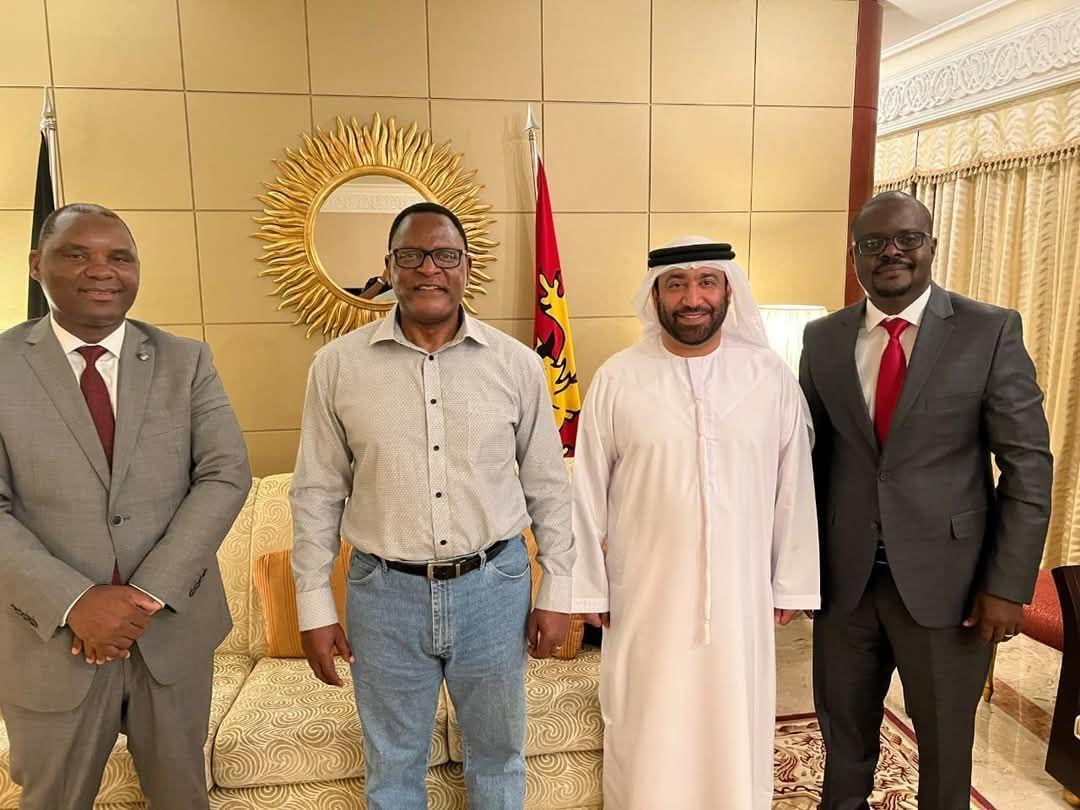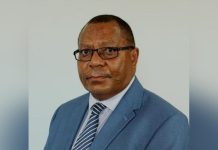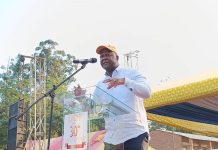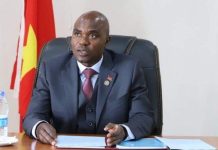By Mike J. Kangwele
Africa-Press – Malawi. After days of huffing and puffing, misleading political allies and supporters, former President Lazarus Chakwera came to accept that he had been defeated. Not only that, but he also acknowledged what we have been saying all along: life in Malawi has been hard and it is all thanks to Chakwera. The announcement of the Malawi Electoral Commission tonight was just a confirmation of the obvious: the reign of the man from Kasiya is over. We can only pray it is for good since the political resurrection of APM can fill that man with ideas, but we will fast that he never returns again.
While on the campaign, Chakwera had appeared buoyant and confident, today in his speech Chakwera was subdued and respectful. He looked sad, like he was the person we have been for the past 5 years: sad, dejected and mocked. For, when we complained to Chakwera that the prices of farm inputs were out of reach for most of us, he pranced into parliament and did a SOSISA economic calculation telling us that for selling one bag of maize then one could afford a bag of fertilizer and be left with some change. Perhaps, his expectation was that we should celebrate him.
In power, Chakwera was tone-deaf. His campaign promise of servant leadership was discarded the same day that he was voted President.
The key question that nations grapple with when a President loses power is in how they will get to remember that President. Of course, leaders leave varying legacies. Among supporters, they may be the best thing to ever happened. Among critics, the worst thing. Yet, the truth lies with the citizens who had no dog in the reign. And that is the position that I find myself in.
As one of those who had high hopes when Chakwera came to office, I cannot hide my disappointment with the way Chakwera ruled. From the very first days of his leadership, I saw a clueless leader who was only excited with the prospect of being in power. The demands and sacrifices of office never mattered to him.
Lazarus Chakwera came in office in a difficult time. It was just when the Covid pandemic was still at peak and the world was on a lockdown such that business had slowed. Yet, once he came to power, Chakwera did not show that he was captaining a troubled ship. Instead, he became a man who wanted to prove to all and sundry that he had chanced on a bag of money and he was not afraid of splashing it. His flamboyant inauguration, which had to be checked by a burdened citizenry, was an indication that the man did not understand the times and he was just a matter of days before he could explode.
Exploding he did, not long afterwards. When the chance came for Chakwera to make appointments, he just proven to all those who still believed in him that he was not the messiah they were waiting for. In one swoop, Chakwera gave away most of the important state house positions to family members, tribal friends and a gang of graduates from the University that is affiliated to him: the African Bible College.
His penchant for familial and nepotistic appointments did not end at the team working at the state house. When the chance came for Chakwera to appoint a cabinet, again it was to these weak ties that he turned to. Chakwera went for people who were related to him, or related to each other, or just came from his part of the tribe. Those who were sprinkled in to sanitise the appearance of the cabinet were to have a tough ride among that band of clansmen. It was indeed a point for Chakwera to make sure that all important cabinet portfolios went to his tribesmen regardless of their competence: think Simplex Chithyola at the ministry of finance.
With his ‘boys from home’ cabinet in place, Chakwera made sure that he equally protects the corrupt kingpins of this country. While on the campaign trail this Pentecostal Reverend promised Malawians an end to impunity and a decisive hand on corruption, in power Chakwera became the very force that propelled corruption. When an audit revealed that his ministers had been helping themselves to Covid money, Chakwera addressed the nation in his trademark rhetoric promising to decisively deal with those whose hands were found in the cookie jar.
After that, a few arrests were made for low ranking civil servants while the kingpins were left free. In one decisive act he had fired Ken Kandodo, the Minister of Labour, for being involved in the Covid funds heist. However, with no arrest following or indeed any further action, Chakwera was to later grovel in the axed minister’s home constituency claiming that he had been misled into firing the minister. Granted, he did not restore unto him his cabinet post, but the apology did much damage than the firing. It was no surprise when eventually Chakwera was to never act on the Sattargate.
In this country, it appears each government must have its own name and face of corruption that it should be remembered for. For Lazarus Chakwera, it was the case of Zunneth Sattar.
Starting off as allegations of state capture, evidence came to light showing that cronies of Lazarus Chakwera, including his now deceased first Vice President Saulos Chilima, were involved in corrupt dealings with a British businessman. Chakwera, ever the man to turn occasions into his own personal political benefit, was quick to unleash the police on his vice president. In a country first, the veep was arrested on corruption charges.
However, the hypocrisy of Chakwera was obvious. While the police were racing across town to the courts with Chilima, Chakwera still had in his cabinet people who were equally accused of philandering with Sattar. His own aide in the state house, Prince Kapondamgaga whom common knowledge is that he was running the Sattar errands on behalf of Chakwera, was to be dismissed before quietly resuming work after giving back the gift he got from Sattar – an admission of his own guilt. Chakwera just did not shift the needle to address the issues of corruption.
The Sattargate was not the only one. The reign of Chakwera was defined by dubious contracts, fake transactions and amateur stealing that in any other serious country would have led to the collapse of government. Yet, in all these, Lazarus Chakwera opted to bury his head in the sand while he kept travelling from this and that foreign capital to pose for photos while his coterie of staff members raked in allowances. He was a man who just was not bothered with integrity in the high office.
While Chakwera was busying himself with this and that trip, as well as inviting this and that group of thugs whom he presented to the nation as investors, the actual things needing his attention were collapsing and the man just appeared to have been out of depth. Before people could process how money meant for fertiliser could be embezzled by Chakwera and his henchmen by pretending to pay to a fertiliser company, there were suddenly no packets of sugar in the shops. People had to queue to get sugar.
At the same time as the queues of sugar were building up, motorists again were invited to start forming their queues: there just was no fuel in the fuelling stations. When Chakwera would be asked on such a pressing issue, his information minister would just organise a band of cheerleaders on Facebook to start announcing the offloading of fuel in Tanzania into tankers bound for Malawi. Under Chakwera, this country became a place where fuel journeys were followed with curiosity.
For businesspeople and all Malawians who had something to purchase outside of this country, the incompetence of Chakwera was also to rear its head there. Suddenly, there was no forex in our banks and people failed to pay for such simple transactions as a Netflix subscription. Students in foreign countries suddenly found themselves being chased out of school or accommodation because their banks could not process their payments.
Inflation too came to mark the reign of Chakwera. Goods in shops suddenly stopped having predictable prices. One would go today and find a thing at MK30000, only to go after two days and find the thing at MK50000. This spilled over to cement prices in a country where building is a certain necessity.
To all this, Chakwera’s response was to unleash a band of tribesmen and supporters (they were one and the same) who would rub it in our face that ‘boma ndi lomweli’. You can never find such insensitivity from a group of taxpayers as we did.
The appex of Lazarus Chakwera’s incompetence was seen in the death of his first vice president, Saulos Chilima. On 10 June 2024, the plane carrying Chilima went missing in a foggy Chikangawa forest. The news of the plane, at least to Malawians with ears on the ground, was known by midday. It was only around 5 pm that Chakwera decided to inform the nation. If at least Chakwera had sent out a party to do the serious searching, then it could have been forgivable. However, being the man who saw the missing as a divine answer to his constant Chilima puzzle, he simply laid back and watched events as they unfold.
Then when the whole funeral was over, with allegations fingering him as the mastermind (I would not be harsh as to accuse him of that death despite his incompetence), Chakwera did what every other guilty part in an issue could have done: botched the opportunity this country had of getting closure. He did not institute a Commission of Inquiry until a threat of serious protests was hanging over his head. And when the Commission came, he made sure that he filled it with his own MCP diehards including a university official who had been gawking over Chakwera’s suits just to show how much he was aligned to the Chakwera presidency.
It was no surprise therefore that Chakwera’s cronies were the only people who trusted that Commission of Inquiry. Now, with Chakwera out of the way, people have already started demanding a fresh inquiry.
The exit of Lazarus Chakwera from the high office of the land should be celebrated by all well-meaning Malawians. This should be regardless of whoever has replaced him. Celebrating the end of that terrible and clueless leadership which used panga boys to silence the groaning citizens of this country is only patriotic. This end of Chakwera can only be defined as the end of a mistake that should never have happened, it is an end of an error.
Source: Malawi 24
For More News And Analysis About Malawi Follow Africa-Press






